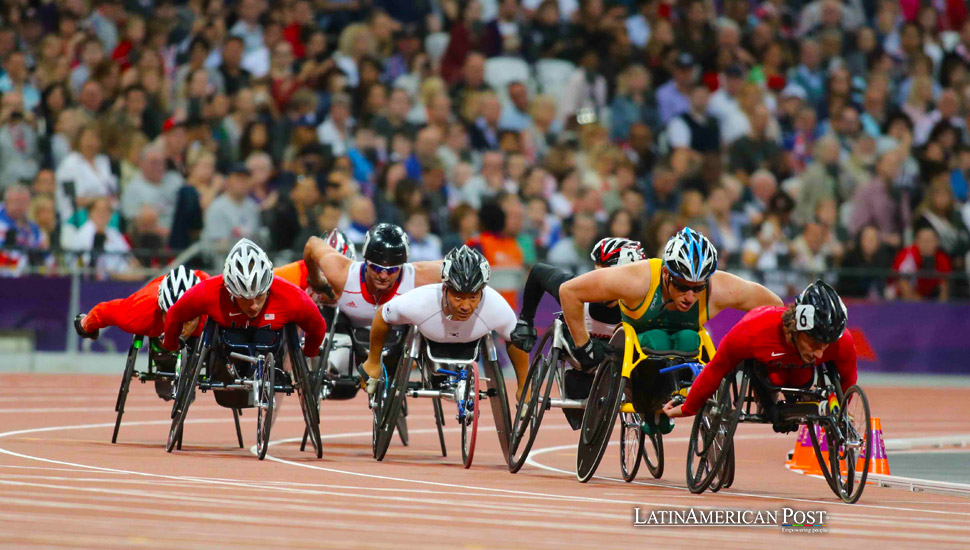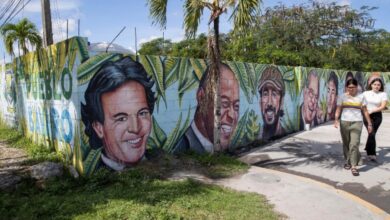Why the Paralympic Games are a Must-Watch Event for Latin America

The Paralympic Games are more than a global sporting event—they are a powerful display of resilience, determination, and excellence. For Latin America, these games are a vital platform for athletes with disabilities to showcase their talents and inspire millions. Here’s why the Paralympics are worth watching and what their significance is for the region.
The Paralympic Games, held two weeks after the Olympics in the same host city, bring together the world’s best athletes with physical disabilities. These games are often overshadowed by their Olympic counterpart, but they deserve equal recognition for the incredible athletic feats and inspiring stories that define the event.
In Latin America, the Paralympic Games hold particular significance. They offer a stage for athletes from the region to demonstrate their skills, challenge societal norms, and break down barriers surrounding disability. The Paralympics are not just about competition; they celebrate the strength of the human spirit and the ability to overcome adversity, making them a must-watch for audiences across the continent.
The origins of the Paralympic Games can be traced back to the aftermath of World War II, during the 1948 London Olympics, when 16 veterans who used wheelchairs participated in a small event—the first official Paralympic Games in Rome in 1960, featuring 400 athletes from 23 countries. Today, the Paralympics have grown significantly, with over 4,400 athletes from 177 countries competing in 22 sports, with 549 gold medals at stake.
Despite ongoing challenges, including the struggle for equal recognition and funding compared to the Olympic Games, the Paralympics continue to inspire and showcase what can be achieved through determination and hard work. For Latin American athletes, these games represent an opportunity to shine on the world stage and inspire others in their communities to pursue their dreams, regardless of obstacles.
Latin America’s Growing Presence in the Paralympics
Latin America’s involvement in the Paralympic Games has expanded steadily, reflecting the region’s growing commitment to supporting athletes with disabilities. Countries like Brazil, Mexico, and Argentina have become powerhouses in the Paralympic movement, consistently bringing home medals and setting new standards of excellence.
Brazil stood out in the last Paralympic Games in Tokyo, finishing seventh in the overall medal tally with 22 golds, 20 silvers, and 30 bronzes. Brazil’s success in the Paralympics has been a source of immense pride for the nation, inspiring a new generation of athletes to engage in sports regardless of physical limitations.
Mexico and Argentina have also made significant strides, with athletes excelling in athletics, swimming, and powerlifting. These achievements are not just about winning medals; they represent a broader social movement towards greater inclusion and recognition of people with disabilities. The Paralympics serve as a reminder that athletes with disabilities can compete at the highest levels and achieve greatness, breaking down barriers and changing perceptions.
A Showcase of Talent and Determination
The Paralympic Games offer a unique array of sports that highlight the athletes’ creativity, innovation, and sheer determination. These sports are not merely adaptations of able-bodied events; they are disciplines with rules, strategies, and traditions, each presenting a different challenge to the competitors.
One of the most exciting sports in the Paralympics is blind soccer, an adaptation of soccer for athletes with visual impairments. The game is played with an audible ball, allowing players to locate it by sound. This sport is a testament to the athletes’ incredible spatial awareness and coordination. In blind soccer, the audience must remain silent to allow players to focus on the sounds of the ball, creating a unique and intense atmosphere. The matches are gripping, with athletes demonstrating remarkable skill as they dribble, pass, and score, all while relying solely on their hearing. In Latin America, where soccer is beloved, the excitement around blind soccer is palpable, and the athletes are celebrated as heroes.
Another captivating Paralympic sport is Boccia, one of the two sports in the Paralympics without an Olympic equivalent. Initially designed for athletes with severe physical disabilities, boccia requires players to place their balls as close as possible to a target ball, the jack. The sport demands precision, strategy, and control, as athletes must carefully calculate their throws to outmaneuver their opponents. Boccia has grown in popularity in Latin America, particularly in Brazil and Mexico, where the sport’s inclusivity and focus on skill over physical strength resonate profoundly with fans.
Wheelchair basketball is perhaps the quintessential Paralympic sport, combining speed, agility, and teamwork. Originating as a rehabilitation activity for World War II veterans, wheelchair basketball has evolved into one of the most popular and competitive sports in the Paralympics. The game is fast-paced and physically demanding, with athletes showcasing their strength and skill as they maneuver their wheelchairs and execute precise shots. In Latin America, wheelchair basketball has gained a large following, with teams from Brazil and Argentina regularly competing at the highest levels. The sport’s dynamic nature and the athletes’ incredible skills make it a must-watch event during the Paralympic Games.
Goalball is another unique sport designed for athletes with visual impairments. In this team sport, players wear blackout masks to ensure an even playing field and must rely entirely on their hearing to track the ball, which contains bells. The objective is to score by rolling the ball into the opponent’s goal while defending their own. The intensity of goalball lies in the athletes’ ability to anticipate the ball’s movement based solely on sound, making it one of the most thrilling and engaging sports in the Paralympics. The sport has gained popularity in Latin America, where teams like Brazil have achieved international success.
Para swimming has been a mainstay of the Paralympics since its inception, offering a broad range of events that accommodate various physical and intellectual disabilities. The sport’s accessibility, requiring no specialized equipment other than what is needed for safety, makes it one of the most inclusive and widely participated sports in the Paralympics. Latin America has a rich history in para-swimming, with athletes from countries like Mexico and Brazil consistently winning medals and setting world records. The sport’s widespread appeal and the athletes’ remarkable performances make it a highlight of the Paralympic Games.
Another cornerstone of the Paralympic Games is para-athletics, which includes track and field events adapted for athletes with physical and intellectual disabilities. The range of events—sprints, long-distance running, jumping, and throwing—ensures that athletes of all abilities can compete. Para-athletics is one of the most competitive and popular sports in the Paralympics, with Latin American athletes frequently topping the podium. Brazil, in particular, has produced some of the world’s best para-athletes, whose achievements have inspired countless others across the region to pursue sports.
A Platform for Social Change
The Paralympic Games have long served as a platform for social change, advocating for the rights and inclusion of people with disabilities. In Latin America, where issues of accessibility and discrimination against people with disabilities remain significant challenges, the Paralympics play a crucial role in raising awareness and promoting inclusivity.
By spotlighting athletes with disabilities, the Paralympics help break down barriers and challenge stereotypes. They show that people with disabilities can achieve greatness and contribute meaningfully to society. This visibility is essential for changing public perceptions and encouraging more significant support for disability rights and inclusion.
The Paralympics also allow Latin American countries to reflect on their progress in supporting people with disabilities. While there have been advancements in accessibility and disability rights in many parts of the region, much work still needs to be done. The Paralympics can catalyze further change, inspiring governments, organizations, and communities to invest in programs and policies that support people with disabilities.
In addition, the Paralympics highlight the importance of representation in sports. For young people with disabilities in Latin America, seeing athletes who look like them competing on the world stage can be incredibly empowering. It shows them that they can pursue their dreams and achieve success, regardless of their challenges. This representation is crucial for building self-confidence and fostering belonging among people with disabilities.
Building on the Paralympic Legacy
As the Paralympic movement grows in Latin America, there are opportunities to build on the games’ legacy and create lasting change. One key area of focus should be increasing access to sports for people with disabilities. While the Paralympics provide a platform for elite athletes, there is a need to ensure that sports are accessible to everyone, regardless of their ability level.
This means investing in adaptive sports programs at the grassroots level, providing training and resources for coaches, and ensuring that sports facilities are accessible to people with disabilities. It also means promoting inclusive physical education programs in schools so that children with disabilities can participate in sports alongside their peers from a young age.
Another critical area of focus is the continued fight for equality in sports. Despite the progress that has been made, there are still significant disparities in funding, media coverage, and recognition between the Paralympics and the Olympics. Closing these gaps is essential for ensuring that athletes with disabilities receive the support and recognition they deserve.
This includes advocating for equal pay for Paralympic athletes, increasing media coverage of the Paralympics, and promoting the stories of Paralympic athletes in the same way that Olympic athletes are celebrated. By doing so, we can help to elevate the Paralympics to the same level as the Olympics and ensure that athletes with disabilities are given the respect and recognition they deserve.
Also read: The Latin Americans Who Brought Home Gold from the Paris Olympics
Finally, the Paralympics offer an opportunity to advocate for disability rights more broadly. The games’ visibility and platform can raise awareness about the challenges faced by people with disabilities in areas such as education, employment, and healthcare. By leveraging the power of the Paralympics, we can continue to push for greater inclusion and equality for people with disabilities in all aspects of society.





